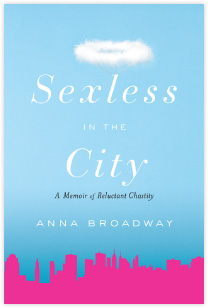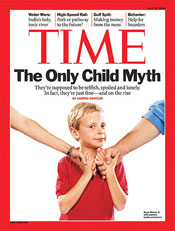 There are more perspectives on doubt, of course, than just my own. I thought it would be a worthwhile idea to let other doubting believers discuss their own experiences with spiritual uncertainty. First up is Anna Broadway, author of Sexless in the City, an excellent book with a subtitle defining it as a “memoir of reluctant chastity.” Anna’s book — which started with a now-defunct blog — is full of fascinating (and funny) explorations of sex, chastity, contemporary romance, and the ways faith winds between those things.
There are more perspectives on doubt, of course, than just my own. I thought it would be a worthwhile idea to let other doubting believers discuss their own experiences with spiritual uncertainty. First up is Anna Broadway, author of Sexless in the City, an excellent book with a subtitle defining it as a “memoir of reluctant chastity.” Anna’s book — which started with a now-defunct blog — is full of fascinating (and funny) explorations of sex, chastity, contemporary romance, and the ways faith winds between those things.
——————
When I first realized that the book Jason had asked me to consider blurbing was focused on doubt, my initial thought was that doubt hadn’t really “had me by the throat” in nearly a decade. But in the months since I finished reading it, what’s impressed me is the underlying notion that doubt is not necessarily the end of one’s relationship with God, any more than a spark-less phase in a marriage need signal imminent divorce. Sadly, I’m not sure Jason’s is such a common perspective.
I was 21 and a college senior when the first real, “this isn’t just intellectual” questions assailed me. And because they were real, and the answers unknown, the chances seemed at least 50/50 that I would end by becoming an atheist.
I wouldn’t say I grew up in a home or a church that discouraged critical thought or careful reflection, but somehow none of the people whose spiritual journeys I knew best had ever talked about their nights alone when the cold air is clammy, the candle gutters from a breeze you didn’t feel, and no one shows up to keep you company through the grim, wee hours watch for daybreak. If anything, the message of the introductory apologetics I’d been exposed to was that, by learning and rehearsing the answers to typical objections, you could pretty much ward off any serious challenge to Christianity before it got too far. What none of those sessions prepared me for was the questions that came from within.
Those questions were different. They weren’t asked in order to lead the discussion down a particular line of argument, but emerged through successive surprises and disappointments. If God was supposed to be the amazingly satisfying being described in the psalms, how come He didn’t show up in my prayers in the same way He had before? Why did opening the Bible come to feel like I was playing songs from the once-beloved mix tape an old boyfriend had made, now sharpened to stab with their dullness? Why had following Him brought me here to a place of singleness, where my chastity killed potential dates faster than an unwiped runny nose?
I languished several months in the grip of those questions, fearful of giving them enough access to steal the password to my faith, but provoked enough by them to get pretty mad at God. Then one weekend, I attended a retreat where the speaker noted — in an observation that still haunts me — an exchange between the disciples and Jesus where He asks if they, too, will leave him and they respond, “Lord, to whom shall we go?” To whom shall we go? It didn’t mean they liked what He was saying, or what following Him was starting to look like, but however rainy and rocky the path, they couldn’t, wouldn’t leave. That was a new concept to me.
There is a lie, deeply insidious and plausible, that preys on youth and naivety. If this is not good/easy/fun/smooth/sating, there’s a better way, it whispers. Abandon this. But how often must we get off the freeway to skirt a jam, only to find the surface streets slow, if not even slower, before we learn that sometimes there’s no easy way, no straight path up a mountain, and no route with constant elevation?
The book (and film) High Fidelity showed this as well as any story I know, in Rob’s realization that sometimes what we long for, in the form we think it exists, is not only fantasy, but depriving us of the actual, good things before and around and presently in our lives. For him, this meant finally staying with who he dating and not jumping ship. Is faith so different?
One of the key things Rob realizes is his fixation on the “first times” and beginnings of romance. Because those are no longer possible with his girlfriend, he’s lost interest, thinking that what lies ahead can only be less — a faded version of the original, fragrant bloom. But why must love (and faith) be more like a flower than wine, spaghetti sauce or cheese?
In my honeymoon phase with God, the only ways I thought one could meet Him were “devotions” where the Bible text was especially apt to one’s circumstances, or an emotionally moving time of musical worship, preferably in a sacred space where the main instruments were guitars and a few hands might be raised, but most eyes would be closed too tight to notice. In those early years, I had no concept of meeting God in the unsatisfied longing for Him, by clasping the hand of a subway beggar with AIDS, or through sudden anger at intimations that Jesus might be a shabby gift-giver.
Looking back now, I wonder a bit if some of the fear and anguish of doubt is not the dying of the younger, less-mature self David Wilcox describes in his song “Young Man Dies“:
There’s a young man dying
as he stands beside the sea.
You can see him smiling, unbelievably free:
wind in his hair, light in his eyes.
He looks a lot like you, and you look so surprised
that he would send you on your way
with no good-byes.
But he can’t go, and you can’t stay,
’cause in the years it takes
to make one man wise,
the young man dies.
Following the questions means not just letting go of old, broken, incomplete ideas about who God is, but also the self who believed, even treasured them — and this perhaps more out of complacency and convenience than we like to admit. But one of the most precious lessons I’ve learned through the ups and downs of the last decade is that my relationship with God is not just based on my initiative, my having a plan for spiritual formation, but His seeking to draw me into deeper intimacy. Sometimes that feels like losing the map, running out of gas and then dropping — and breaking — the flashlight when I trip over a root and cut my knee, but there can be a comfort much richer than anything the sunshine brings in the grace that meets you precisely when you’re crying and swearing over broken skin, convinced it spells the end of all your hopes and dreams and a sentence of misery eternal.
As Christians, we can too often to be spiritual Robs, I fear — seeking mainly after the early stage, the honeymoon. Books like Jason’s provide a good reminder that the New Testament’s major metaphor for the relationship between God and His people is marriage. And the same fortitude which makes a marriage go the distance applies to spiritual commitment as well.
——————
Thanks, Anna! Learn more about Sexless in the City at the book’s official website.
Anna’s no longer blogging but you can follow her on Twitter. She lives in the Bay Area of California.

